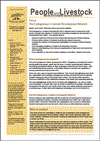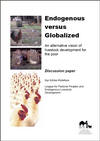People and Livestock newsletter

The April 2007 issue of the People and Livestock newsletter focuses on endogenous livestock development. The newsletter is now published by the Endogenous Livestock Development Network, www.eldev.net. LPP is a founding member of this network.
Read online or download 158 kb, 9 pages
Endogenous versus globalized

An alternative vision of livestock development for the poor
This discussion paper by Ilse Köhler-Rollefson criticizes the dominant approach to livestock development, which focuses on cash and productivity, and focuses on the animals rather than on the people who keep them.
It offers an alternative, “endogenous” approach, basing development on livestock keeper’s own knowledge and resources, with appropriate inputs from outside.
The paper concludes that following in the tracks of Northern livestock development may be disastrous for developing countries that cannot absorb rural poor into the urban labour force.
Download 255 kb, 23 pages
Organising around breeds pays dividends

Lobbying by LIFE-Network India, an alliance of NGOs and pastoralist groups, is beginning to bear fruit as policy changes that benefit indigenous livestock and rural livelihoods.
For example, the scope of the “Recognition of Forest Rights Bill 2005”, that originally only gave rights to forest-dwelling tribes, was expanded to include the grazing rights of nomadic and settled pastoralist communities in forests. This legislation was passed by parliament on 7 December, 2006.
The National Draft Policy on Farmers emphasises the close relationship between livestock keeping, sustainable livelihoods, and access to grazing land. It spells out the need for securing pastoralists’ forest grazing rights, including in national parks and other protected areas.
An increasing number of Indian government actors are starting to take notice of the role of pastoralists as custodians of livestock breeds and their role on conserving biodiversity.
Further details 27 kb
- Go to the previous page
- 1
- …
- 58
- 59
- 60
- 61
- 62
- 63
- 64
- …
- 76
- Go to the next page
